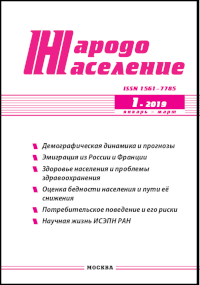Эмиграционные процессы из России: направления, масштабы, этническая структура
Для цитирования
Рыбаковский Л. Л., Кожевникова Н. И. Эмиграционные процессы из России: направления, масштабы, этническая структура // Народонаселение. 2019. Том 22. № 1. С. 40-50. DOI: https://doi.org/10.19181/1561-7785-2019-00003
Аннотация
Вслед за развалом Советского Союза в России радикально изменилась структура миграционных процессов, произошла трансформация значительной части внутренних миграций в международные. Хотя масштабы внутренних миграций заметно уменьшились, но все равно они продолжали в разы превышать международные. Наряду с реэмиграцией русских и иммиграцией лиц других национальностей в Россию из стран нового зарубежья, принявших массовый характер, существенно возросли и международные эмиграции из России в государства старого зарубежья. Этот международный миграционный поток стал для постсоветского времени постоянным. Проведенный анализ статистических данных позволил сделать вывод о том, что существенно выросшие масштабы международных миграций в 90-е годы, в нулевые годы ХХI столетия заметно сократились. Это относится как к иммиграционным потокам в Россию из стран нового зарубежья, так и к эмиграционным потокам из России в государства старого зарубежья. Несмотря на существенное сокращение масштабов эмиграции из России в ХХI веке, основными для неё странами — реципиентами эмигрантов, как были изначально, так и остались до сих пор, Германия, Израиль и США. Последнее обусловлено этнической компонентой. В статье показано, в какой мере международные миграции наносят ущерб России и улучшают трудовой (прежде всего, научнотехнический) и демографический потенциал ряда стран-реципиентов, подчеркивается, что решение этих проблем остается за бортом государственной миграционной политики.
Ключевые слова:
страны реципиенты, страны-доноры, эмиграция, иммиграция, старое зарубежье, новое зарубежье, этническая компонента
Литература
Миграционные процессы в России. Под ред. Локосова В. В. и Рыбаковского. Л.Л. — М .: Экон-информ. 2014.
Зайончковская Ж. А. Эмиграция в дальнее зарубежье // Население и общество. — № 58 октябрь 2001.
Ионцев В. А. и др. Эмиграция и репатриация в России. — М .: Попечительство о нуждах российских репатриантов. 2001.
Полян П. Эмиграция: кто и когда в XX веке покидал Россию. // Демоскоп. — 2006. — № 251– 252. [Электронный ресурс] — Р ежим доступа: http://www.demoscope.ru/weekly/2006/0251/ analit01.php
Тольц М. Постсоветская еврейская диаспора: новейшие оценки. / Демоскоп. — 2012. — № 497– 498. — [Электронный ресурс] — Р ежим доступа: http://www.demoscope.ru/weekly/2012/0497/ tema01.php
Миграция специалистов России: причины, последствия, оценки. Программа по исследованию миграции. Выпуск 6. — М .: Макс-пресс. 1994.
Утечка умов и национальная безопасность. Материалы научно-практической конференции в Российской Академии государственной службы при Президенте РФ, 15 апреля 1998 г. М., 1998.
Осипов Г. В. Социология и общество. — М .: Норма. 2007.
Рязанцев С. В. Влияние миграции на социально-экономическое развитие Европы: современные тенденции. Ставрополь. 2001.
Эмиграция женщин из России. Демография. — [Электронный ресурс] — Р ежим доступа:
http://wiki.ru/sites/demografiya/id-articles-438057.html
Новиков-Прибой А.С. В бухте «Отрада». — М .: Московский рабочий. 1977.
Зайончковская Ж. А. Эмиграция в дальнее зарубежье // Население и общество. — № 58 октябрь 2001.
Ионцев В. А. и др. Эмиграция и репатриация в России. — М .: Попечительство о нуждах российских репатриантов. 2001.
Полян П. Эмиграция: кто и когда в XX веке покидал Россию. // Демоскоп. — 2006. — № 251– 252. [Электронный ресурс] — Р ежим доступа: http://www.demoscope.ru/weekly/2006/0251/ analit01.php
Тольц М. Постсоветская еврейская диаспора: новейшие оценки. / Демоскоп. — 2012. — № 497– 498. — [Электронный ресурс] — Р ежим доступа: http://www.demoscope.ru/weekly/2012/0497/ tema01.php
Миграция специалистов России: причины, последствия, оценки. Программа по исследованию миграции. Выпуск 6. — М .: Макс-пресс. 1994.
Утечка умов и национальная безопасность. Материалы научно-практической конференции в Российской Академии государственной службы при Президенте РФ, 15 апреля 1998 г. М., 1998.
Осипов Г. В. Социология и общество. — М .: Норма. 2007.
Рязанцев С. В. Влияние миграции на социально-экономическое развитие Европы: современные тенденции. Ставрополь. 2001.
Эмиграция женщин из России. Демография. — [Электронный ресурс] — Р ежим доступа:
http://wiki.ru/sites/demografiya/id-articles-438057.html
Новиков-Прибой А.С. В бухте «Отрада». — М .: Московский рабочий. 1977.
Форматы цитирования
Другие форматы цитирования:
APA
Рыбаковский, Л. Л., & Кожевникова, Н. И. (2019). Эмиграционные процессы из России: направления, масштабы, этническая структура. Народонаселение, 22(1), 40-50. https://doi.org/10.19181/1561-7785-2019-00003
Раздел
ЭМИГРАЦИЯ ИЗ РОССИИ И ФРАНЦИИ








